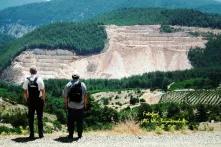
The „Production Reform Package Bill“ proposed by the Ministry of Science, Industry and Technology sparked a nationwide debate during the last week. The package consists of 76 articles and proposes among others changes in the Law No. 3573 currently in force, which regulates the olive cultivation. The most crucial change is related to Article No. 20 of this law, which outlaws the construction of factories near olive groves, determining a minimum distance of 3 kilometers for any plant that produces chemical waste. The law also very strictly regulates the chopping down of olive trees, saying that even if the necessary permits are obtained, olive trees may not be cut down unless there is an absolute imperative, which has to be defined by the government. The new proposal however states, that if no alternatives are found and approval has been obtained, the Ministry of Food, Agriculture and Livestock may authorize investors to build on olive groves, if such an investment is categorized as being in the public interest. The government used a very similar phrasing earlier this year to allow construction in ecologically protected areas.
The bill, labeled by its opponents “the death warrant of olive production“ was initially scheduled to be discussed in the parliament this week. However Mustafa Elitaş, Group Deputy Chairman of the AKP, first announced a few days ago that it was sent back to the commission for amendments, and it was then announced on Tuesday that the proposed article was completely taken out of the bill- a step which has to be attributed to the unexpected reactions from the public.
It is rare in Turkey that a bill draws such a public ire. Even the renowned pop-singer Tarkan posted on his twitter account a pro-olive statement: “The biggest blessing of a country is its nature. Olive trees are the treasury, the memory of Anatolia. Don’t sacrifice the olive trees for profit.” In response to his criticism Faruk Özlü, Minister of Science Industry and Technology rhetorically asked what Tarkan was going to do with olive groves anyway. “We love his songs” the Minister said, and advised that he should continue singing, i.e. minding his own business. Tarkan responded by publishing a photo of an olive tree on his official instagram account with the following caption: “I am older than the common era, the discovery of America by the white man, the Grand National Assembly of Turkey, the United Nations. I am two thousand years old. #IamAnOliveTree”. His move was repeated by thousands of his followers.
The recent withdrawal of the olive cultivation regulation from the bill has to be perceived as the success of nationwide campaigns. However the authorities also admitted that similar proposals can be brought forward again until the needs of the sector are met definitely. Abdullah Aysu, Leader of the Confederation of Farmers‘ Unions offered an insight into the reasons behind the government’s fervently pursuit of olive lands: By cutting down olive groves, not only will a considerable amount of land be opened for investment in tourism, mining or construction. Furthermore Turkey a country with a growing energy demand is increasingly investing in thermal power plants which are run by coal. Since the necessary coal is imported from low-quality coal exporters such as Columbia, those thermal power plants need to be built in proximity to ports. The existing olive cultivation lands are by nature appropriate spots for that aim, since they are mostly spread nearby the coastal line of the country.
Given the interrelated and complex nature of the underlying motives behind it and the foreseeable destructive effects on land and people, one can expect that neither the insistence of the government nor the resistance will quiet down in the near future.



